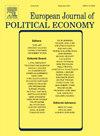以亲属为基础的制度和国家能力
IF 2.4
3区 经济学
Q2 ECONOMICS
引用次数: 0
摘要
本文考察了亲属制度与国家能力之间的关系。结果表明,亲属关系网络的强度是当今国家能力的一个强有力的预测指标,无论是在国家之间还是在国家内部。历史上以更紧密的亲属制度为特征的社会,今天往往有更弱的国家。在考虑了可能与亲属网络强度和国家能力相关的各种变量(包括广泛的地理、历史和当代因素)之后,这一发现成立。当采用工具变量方法(利用中世纪天主教婚姻法的历史暴露中似是而非的外生变化)时,结果也很稳健。此外,分析还显示,拥有密集亲属制度的社会通常表现出较低的政治集中化。鉴于政治集中化在建立国家能力方面的重要作用,这一发现有助于解释亲属关系强度与国家能力之间的负相关关系。本文章由计算机程序翻译,如有差异,请以英文原文为准。
Kin-based institutions and state capacity
This paper examines the relationship between kin-based institutions and state capacity. The results show that the intensity of kinship networks is a strong predictor of present-day state capacity, both across and within countries. Societies historically characterized by more intensive kinship systems tend to have weaker states today. This finding holds after accounting for various variables that may be correlated with both kinship network intensity and state capacity, including a broad range of geographic, historical, and contemporary factors. The results are also robust when employing an instrumental variable approach that exploits plausibly exogenous variation in historical exposure to the marriage laws of the medieval Catholic Church. Additionally, the analysis reveals that societies with intensive kin-based institutions typically exhibit lower political centralization. Given the essential role of political centralization in establishing state capacity, this finding helps explain the negative association between kinship intensity and state capacity.
求助全文
通过发布文献求助,成功后即可免费获取论文全文。
去求助
来源期刊

European Journal of Political Economy
Multiple-
CiteScore
3.40
自引率
10.00%
发文量
106
期刊介绍:
The aim of the European Journal of Political Economy is to disseminate original theoretical and empirical research on economic phenomena within a scope that encompasses collective decision making, political behavior, and the role of institutions. Contributions are invited from the international community of researchers. Manuscripts must be published in English. Starting 2008, the European Journal of Political Economy is indexed in the Social Sciences Citation Index published by Thomson Scientific (formerly ISI).
 求助内容:
求助内容: 应助结果提醒方式:
应助结果提醒方式:


